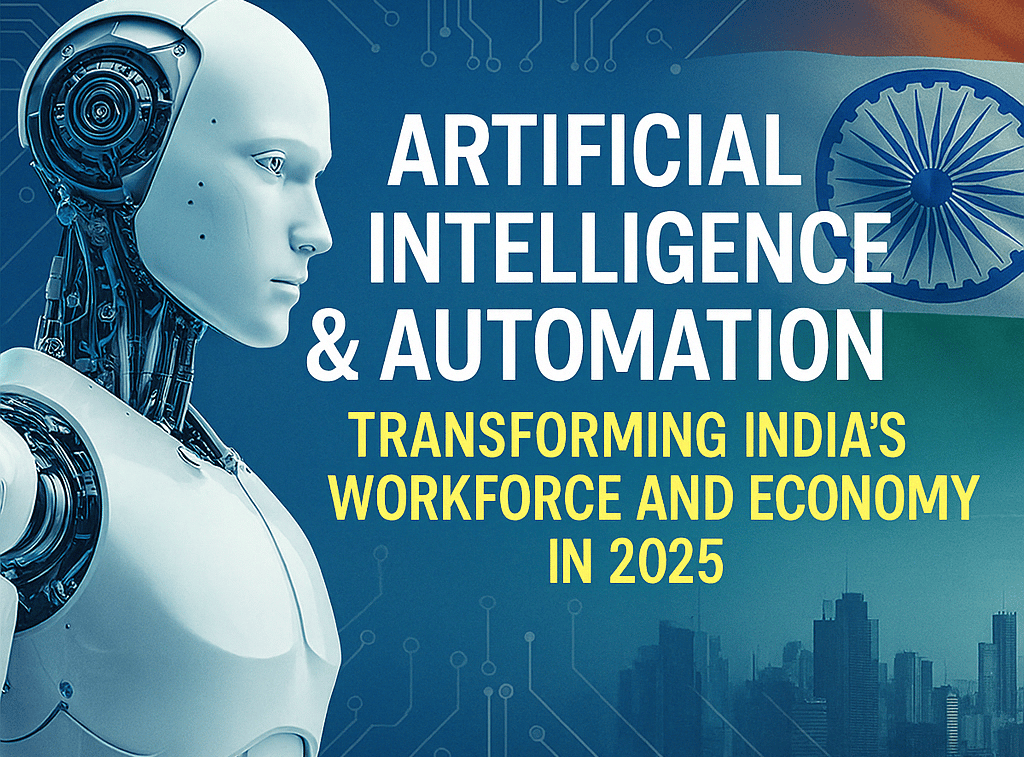Artificial Intelligence & Automation in India 2025 – Trends & Impact
4/15/20254 min read


Artificial Intelligence & Automation: Transforming India’s Workforce and Economy in 2025
Artificial Intelligence & Automation are no longer futuristic concepts—they are now integral to India’s economic development and workplace transformation. From streamlining manufacturing to powering fintech innovations, AI is reshaping how businesses operate and how individuals work. In 2025, this technological evolution is not just enhancing efficiency but also redefining career paths, entrepreneurship, and national productivity.
As we delve deeper into the implications of Artificial Intelligence & Automation, it's crucial to understand how these technologies are transforming not just industries but also the very fabric of our society. For example, in the realm of education, AI-driven platforms are personalizing learning experiences, allowing students to learn at their own pace and in ways that suit their individual learning styles. This shift not only enhances educational outcomes but also prepares a new generation of workers who are adept at using technology in their careers.
AI Adoption Across Sectors: Case Studies
AI Adoption Across Sectors
In agriculture, AI applications are also showing significant promise. A pioneering initiative in Punjab uses machine learning to predict crop yields based on various environmental factors. Farmers receive actionable insights that help them make informed decisions about planting and harvesting, ultimately leading to increased food security and economic stability in rural areas.
The logistics sector is witnessing a similar transformation. AI systems are optimizing supply chains by analyzing traffic patterns and weather conditions to better predict delivery times. Companies are using AI-powered analytics to improve inventory management, which in turn reduces waste and enhances customer satisfaction.
Impact on Employment: New Opportunities
Additionally, the demand for tech-savvy workers is escalating. Emerging roles such as AI ethics compliance officers and machine learning engineers are becoming crucial. As businesses increasingly rely on AI, professionals who can navigate both the technical and ethical aspects of AI deployment are in high demand. Companies are investing in training programs to upskill their workforce, which is a positive trend towards a more adaptable labor force.
The gig economy is thriving, with platforms like Uber and Zomato utilizing AI to match supply with demand in real-time. This creates a fluid job market where individuals can leverage their skills for flexible work options, thereby balancing personal and professional commitments.
AI in Public Governance: Real-World Applications
Moreover, AI-enhanced applications like the 'Sewa Kendras' have simplified access to government services, ensuring that citizens receive timely and efficient solutions to their queries and complaints. This not only builds trust between the government and the public but also fosters a culture of accountability.
Furthermore, AI is driving a new era of transparency in governance. Take the smart city initiative in Ahmedabad, which utilizes AI for real-time monitoring of infrastructure to improve service delivery. By analyzing data collected from IoT devices, the city can proactively address issues like water leakage and traffic congestion, demonstrating how technology can enhance urban living.
For instance, consider the use of AI in healthcare. The implementation of AI algorithms in diagnostic tools has led to breakthroughs in early disease detection. A notable case is the partnership between a major Indian hospital and a tech firm, which developed an AI system that can analyze medical images to detect cancers with higher accuracy than traditional methods. Such advancements not only improve patient outcomes but also reduce the burden on healthcare professionals.
Addressing concerns regarding the digital divide is paramount. Many rural areas lack access to the necessary infrastructure to benefit from AI advancements. To bridge this gap, initiatives aimed at enhancing digital literacy and expanding internet access are essential. Partnerships between the public and private sectors can facilitate the development of such initiatives, ensuring that all segments of society can participate in the digital economy.
The importance of ethical AI practices cannot be overstated. As AI systems are integrated into critical decision-making processes, establishing guidelines that promote fairness and accountability is crucial. Organizations that prioritize ethical considerations in their AI strategies will not only mitigate risks but also foster public trust in technological advancements.
Final Thoughts: Embracing AI for a Brighter Future
Ultimately, the journey toward an AI-integrated future is not just about technology but also about fostering a culture of innovation and adaptability. By embracing AI and automation, India can unlock new economic opportunities, enhance the quality of life, and establish itself as a leader in the global technological landscape. The future is bright, and with the right strategies, India can ensure that no one is left behind in this remarkable transformation.
Challenges and the Road Ahead: Addressing Concerns
The Role of Artificial Intelligence in Workforce Transformation
India has rapidly embraced AI across multiple industries. Sectors such as healthcare, agriculture, logistics, customer service, and finance have experienced significant automation. For instance, diagnostic AI tools now assist doctors in detecting diseases faster and more accurately. In agriculture, predictive algorithms guide farmers on crop cycles and weather patterns, increasing yield and minimizing risk.
Meanwhile, automation in manufacturing—particularly in smartphone and electronics assembly—has improved output and reduced errors. This positions India as a competitive global hub, boosting exports and driving employment in high-tech zones.
Impact on Employment
While the fear of job losses due to automation persists, the reality is more nuanced. Routine and repetitive tasks are increasingly handled by machines, but this shift is creating demand for new job roles that didn’t exist a few years ago—AI trainers, data analysts, robotics engineers, and cybersecurity specialists.
Additionally, reskilling initiatives by both government and private entities are preparing workers for a digital economy. The gig economy and remote work culture, amplified by automation tools, are opening flexible career opportunities across geographies.
AI in Public Governance
India’s government is also integrating AI in governance. Initiatives like AI-powered grievance redressal systems, automated toll collections, and digital document verification (e.g., Digilocker) are making public services more transparent and accessible.
Smart city projects are leveraging AI to optimize traffic flow, monitor pollution, and enhance urban planning. These innovations contribute to a more sustainable and citizen-friendly infrastructure.
Challenges and the Road Ahead
Despite its benefits, the adoption of Artificial Intelligence & Automation in India faces challenges—digital divide, data privacy concerns, and the need for ethical AI practices. As AI becomes more embedded in decision-making, there’s a growing need for regulatory frameworks to ensure fairness, security, and accountability.
However, with India’s strong pool of IT talent and government support through initiatives like the National AI Strategy, the future looks promising. The key lies in inclusive growth—ensuring small businesses and rural populations also benefit from AI innovation.
Final Thoughts
Artificial intelligence and automation are not threats—they are tools for empowerment when used strategically. In 2025, India stands at the cusp of an AI-led revolution that promises smarter business, better services, and a stronger economy. The time to embrace and adapt is now.
About One Solution
Quick Links
Contact Info
One Solution — Your trusted partner for financial success.
📍 F17, Grand Plaza, Paltan Bazar
Guwahati, Kamrup (M), Assam
India, Pin: 781008
📞 9650072280
© 2025 One Solution. All Rights Reserved.
